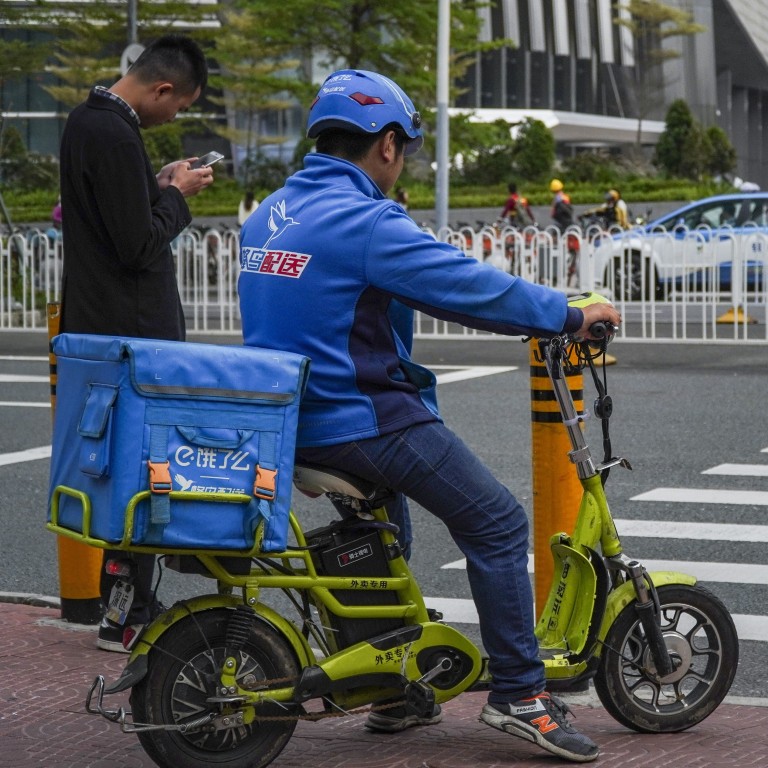
China’s Ele.me stirs outcry after initial low compensation for delivery worker’s death
- The 43-year-old courier came from northwest Shanxi province but worked in Beijing for Fengniao Zhongbao, Ele.me’s crowdsourced on-demand logistics service
- Ele.me is the second-largest player in the on-demand market, with more than 3 million riders who handle deliveries ranging from packages to food
Chinese food delivery giant Ele.me is facing a backlash on social media after the platform initially said it could only pay 2,000 yuan (US$309) in compensation to the family of a courier who collapsed on the job, sparking a debate over worker’s rights in the gig economy era.
Under pressure from the public, the food delivery platform has increased accident insurance via its crowdsourced on-demand logistics service, Fengniao Zhongbao. In a statement on Friday night, Ele.me said the insurance structure for crowdsourcing couriers was not reasonable but after “discussion with all parties”, the insurance payment for the deceased worker’s family will be increased to 600,000 yuan.
The 43-year-old courier surnamed Han, from northwest Shanxi province but working in Beijing, was a gig worker for Fengniao Zhongbao. He died while on duty last month.
He was covered by an employment arrangement common among many on-demand services internet companies, meaning that he was not a full-time employee for the food delivery platform, exempting it from any legal responsibility for the death.
“The employment arrangement is the biggest loophole in the on-demand food delivery industry,” said Meng Huixin, an analyst at Hangzhou-based e-commerce consulting firm 100ec.cn. “Most on-demand food delivery platforms are not tied to riders in labour contracts. Instead they seek to reduce costs and avoid legal risk by outsourcing their demand for labour.”
There is no labour relationship between Han and Ele.me, the company was first quoted saying in Chinese media reports. Therefore, all they can offer is compassionate compensation.
Let US firms like Uber and Lyft pay gig workers with equity, SEC proposes
Under Chinese law, employers are required to make monthly contributions to government social security and insurance programs for full-time employees, covering medical, pension and work injuries but the payments are often seen by business as a burden given rising labor costs in China.
Since gig workers are not full-time employees, they are on their own. However, even if not technically full-time employees, riders are still subject to the strict rules platforms impose to ensure speedy deliveries, but according to a 2005 Chinese labour law that could be used as a proof of their employment relationship.
“Riders are required to wear delivery uniforms and are subject to platforms’ assessment and supervision,” said Meng. “This often results in an imbalance in the relationship between the two parties.”
Ele.me is the second-largest player in the on-demand market and is owned by Alibaba Group Holding, owner of the South China Morning Post. It has more than 3 million riders who handle deliveries ranging from packages to food that are ordered via its platform.
The tragic incident comes at a time when millions of low-income workers have become more dependent on Chinese internet companies for jobs as their digital-based services have taken over large swathes of the economy, from food to credit, incurring recent government scrutiny to rein in their growing clout.
Last year the on-demand delivery market in China grew more than 14 per cent year on year to 835 billion yuan, according to market research firm Analysys. Users of these services have reached 500 million, with the number of delivery orders topping 17 billion at the end of 2020.
The discussion about compensation for the dead Fengniao courier went viral on Friday after netizens learned of Ele.me’s response, garnering over 40 million views on Weibo. “If not an employee, then what is he to Ele.me? A bounty hunter?” asked a Weibo user.
Additional reporting by Jane Zhang


